Exploring Corporate Social Responsibility
VerifiedAdded on 2020/06/04
|10
|2618
|67
AI Summary
The assignment delves into the concept of Corporate Social Responsibility (CSR) by examining multiple research papers. It explores the influence of CSR on organizational structure and performance, while also considering methodologies used in CSR research such as action research and post-qualitative approaches. The papers further discuss topics like conflict translation, board roles in integrated reporting, perceived CSR impact, and competition-motivated CSR.
Contribute Materials
Your contribution can guide someone’s learning journey. Share your
documents today.
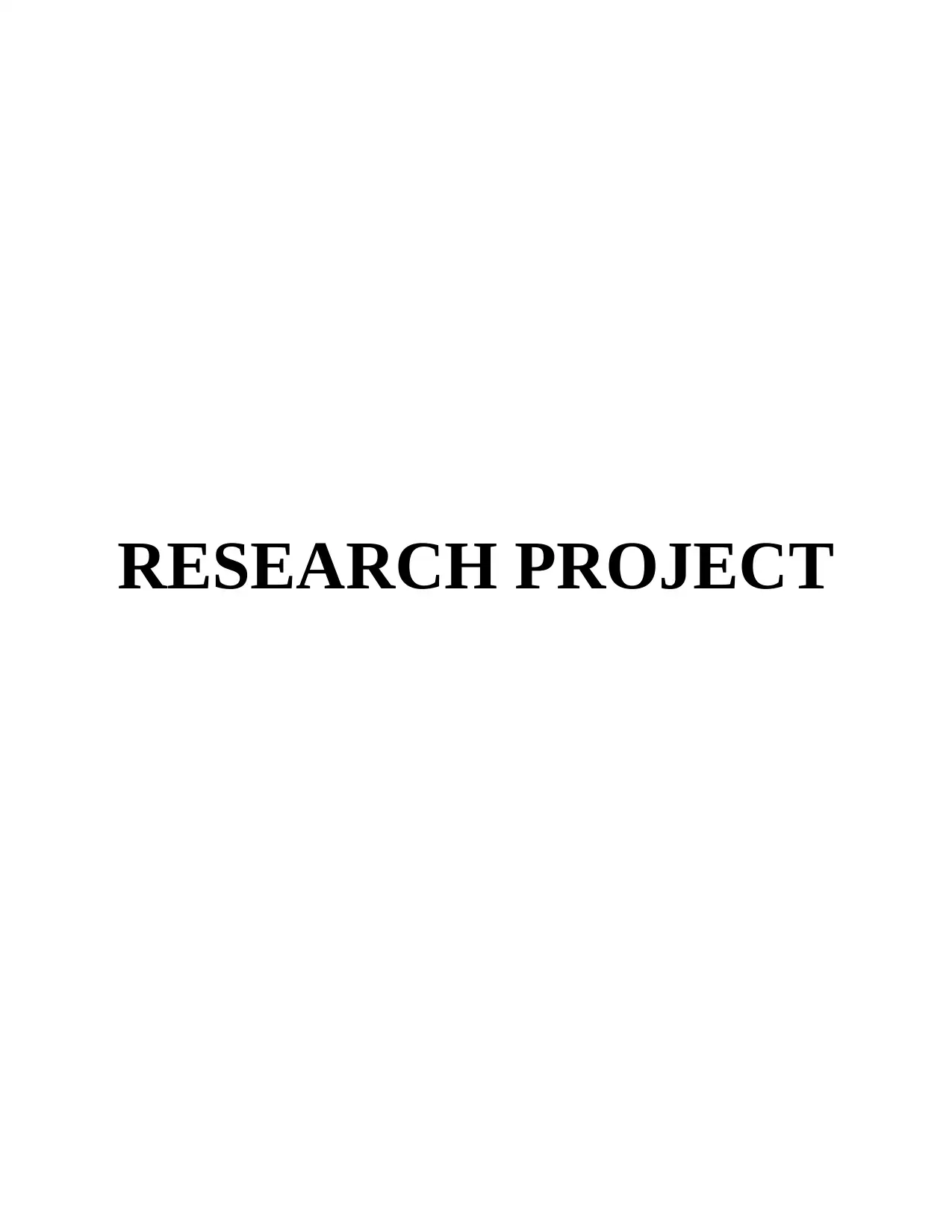
RESEARCH PROJECT
Secure Best Marks with AI Grader
Need help grading? Try our AI Grader for instant feedback on your assignments.
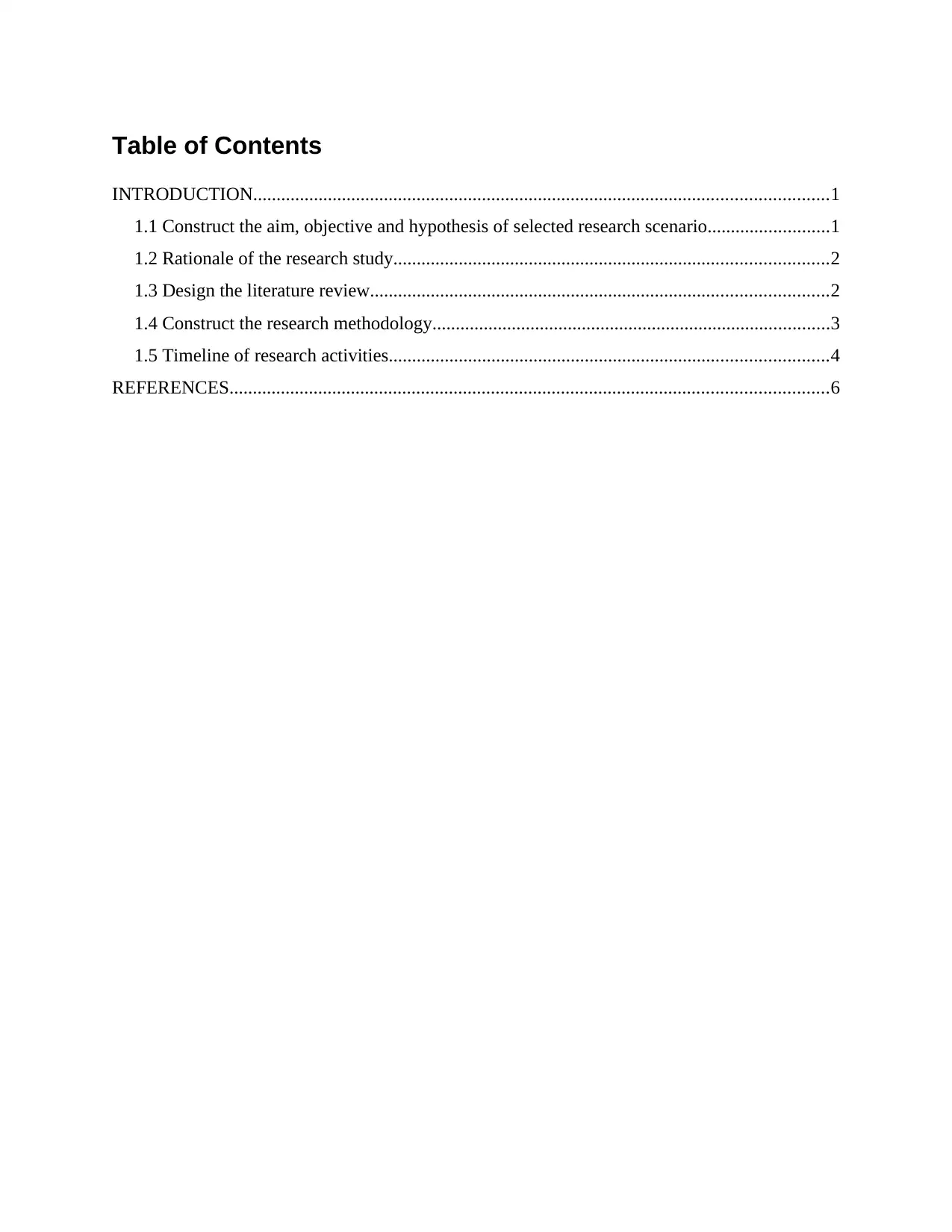
Table of Contents
INTRODUCTION...........................................................................................................................1
1.1 Construct the aim, objective and hypothesis of selected research scenario..........................1
1.2 Rationale of the research study.............................................................................................2
1.3 Design the literature review..................................................................................................2
1.4 Construct the research methodology.....................................................................................3
1.5 Timeline of research activities..............................................................................................4
REFERENCES................................................................................................................................6
INTRODUCTION...........................................................................................................................1
1.1 Construct the aim, objective and hypothesis of selected research scenario..........................1
1.2 Rationale of the research study.............................................................................................2
1.3 Design the literature review..................................................................................................2
1.4 Construct the research methodology.....................................................................................3
1.5 Timeline of research activities..............................................................................................4
REFERENCES................................................................................................................................6
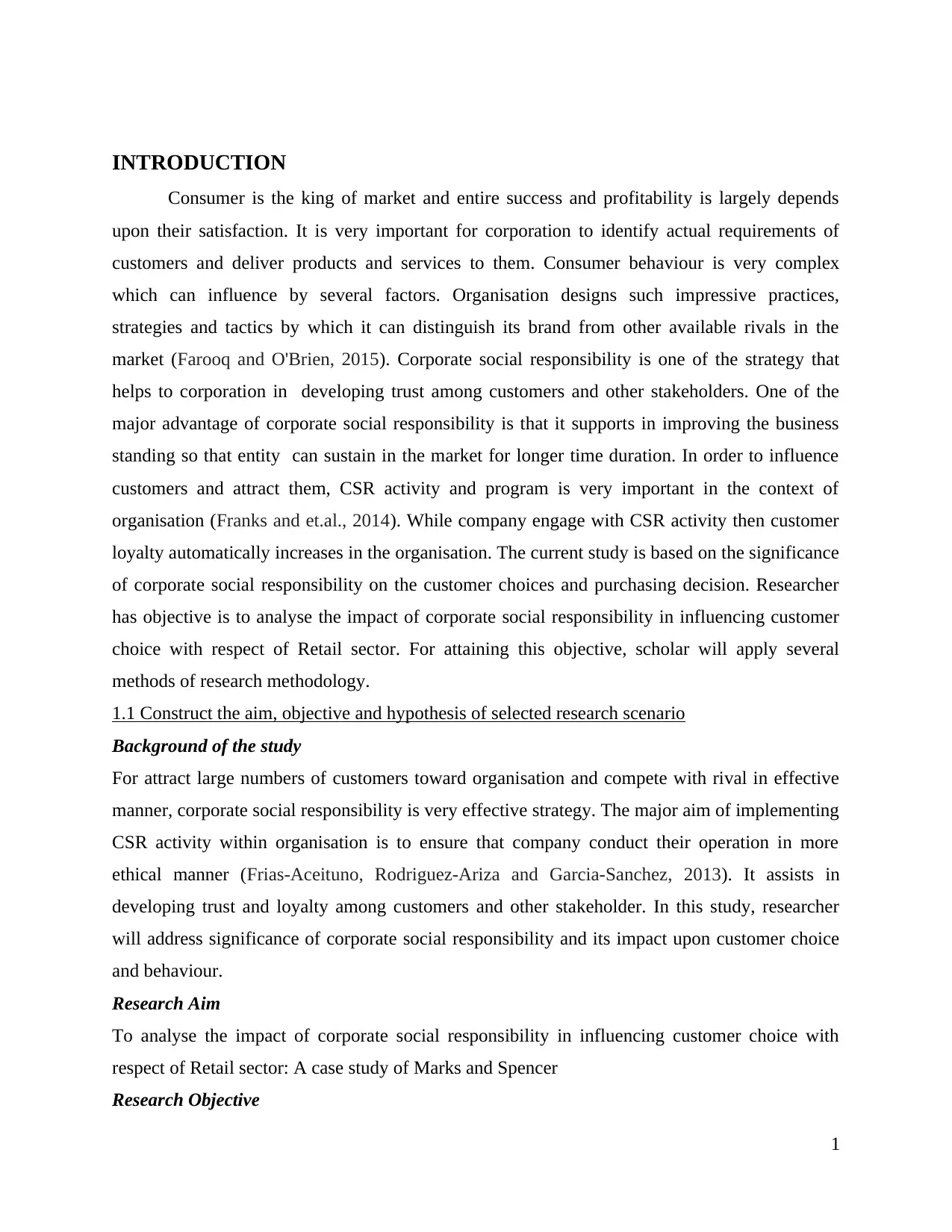
INTRODUCTION
Consumer is the king of market and entire success and profitability is largely depends
upon their satisfaction. It is very important for corporation to identify actual requirements of
customers and deliver products and services to them. Consumer behaviour is very complex
which can influence by several factors. Organisation designs such impressive practices,
strategies and tactics by which it can distinguish its brand from other available rivals in the
market (Farooq and O'Brien, 2015). Corporate social responsibility is one of the strategy that
helps to corporation in developing trust among customers and other stakeholders. One of the
major advantage of corporate social responsibility is that it supports in improving the business
standing so that entity can sustain in the market for longer time duration. In order to influence
customers and attract them, CSR activity and program is very important in the context of
organisation (Franks and et.al., 2014). While company engage with CSR activity then customer
loyalty automatically increases in the organisation. The current study is based on the significance
of corporate social responsibility on the customer choices and purchasing decision. Researcher
has objective is to analyse the impact of corporate social responsibility in influencing customer
choice with respect of Retail sector. For attaining this objective, scholar will apply several
methods of research methodology.
1.1 Construct the aim, objective and hypothesis of selected research scenario
Background of the study
For attract large numbers of customers toward organisation and compete with rival in effective
manner, corporate social responsibility is very effective strategy. The major aim of implementing
CSR activity within organisation is to ensure that company conduct their operation in more
ethical manner (Frias‐Aceituno, Rodriguez‐Ariza and Garcia‐Sanchez, 2013). It assists in
developing trust and loyalty among customers and other stakeholder. In this study, researcher
will address significance of corporate social responsibility and its impact upon customer choice
and behaviour.
Research Aim
To analyse the impact of corporate social responsibility in influencing customer choice with
respect of Retail sector: A case study of Marks and Spencer
Research Objective
1
Consumer is the king of market and entire success and profitability is largely depends
upon their satisfaction. It is very important for corporation to identify actual requirements of
customers and deliver products and services to them. Consumer behaviour is very complex
which can influence by several factors. Organisation designs such impressive practices,
strategies and tactics by which it can distinguish its brand from other available rivals in the
market (Farooq and O'Brien, 2015). Corporate social responsibility is one of the strategy that
helps to corporation in developing trust among customers and other stakeholders. One of the
major advantage of corporate social responsibility is that it supports in improving the business
standing so that entity can sustain in the market for longer time duration. In order to influence
customers and attract them, CSR activity and program is very important in the context of
organisation (Franks and et.al., 2014). While company engage with CSR activity then customer
loyalty automatically increases in the organisation. The current study is based on the significance
of corporate social responsibility on the customer choices and purchasing decision. Researcher
has objective is to analyse the impact of corporate social responsibility in influencing customer
choice with respect of Retail sector. For attaining this objective, scholar will apply several
methods of research methodology.
1.1 Construct the aim, objective and hypothesis of selected research scenario
Background of the study
For attract large numbers of customers toward organisation and compete with rival in effective
manner, corporate social responsibility is very effective strategy. The major aim of implementing
CSR activity within organisation is to ensure that company conduct their operation in more
ethical manner (Frias‐Aceituno, Rodriguez‐Ariza and Garcia‐Sanchez, 2013). It assists in
developing trust and loyalty among customers and other stakeholder. In this study, researcher
will address significance of corporate social responsibility and its impact upon customer choice
and behaviour.
Research Aim
To analyse the impact of corporate social responsibility in influencing customer choice with
respect of Retail sector: A case study of Marks and Spencer
Research Objective
1
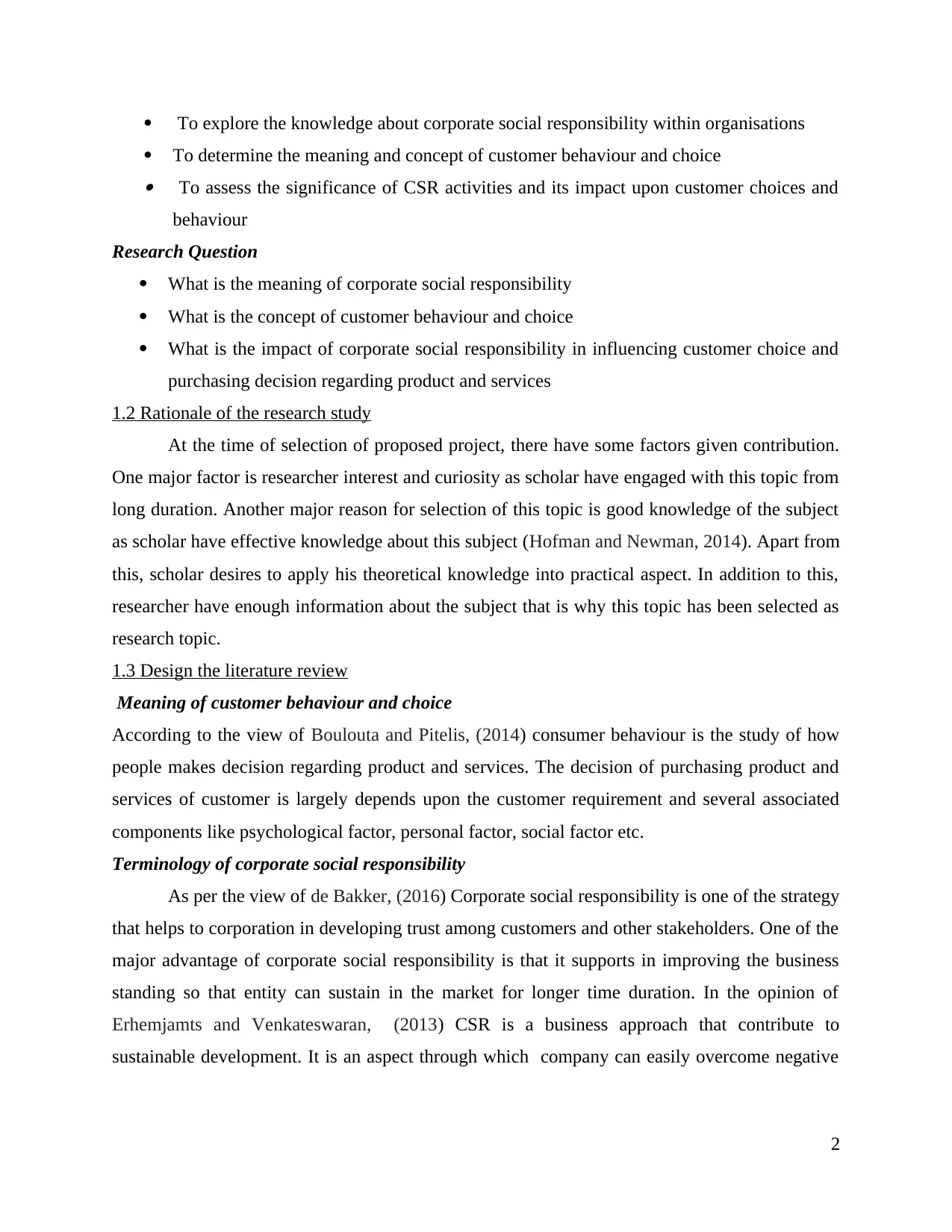
To explore the knowledge about corporate social responsibility within organisations
To determine the meaning and concept of customer behaviour and choice To assess the significance of CSR activities and its impact upon customer choices and
behaviour
Research Question
What is the meaning of corporate social responsibility
What is the concept of customer behaviour and choice
What is the impact of corporate social responsibility in influencing customer choice and
purchasing decision regarding product and services
1.2 Rationale of the research study
At the time of selection of proposed project, there have some factors given contribution.
One major factor is researcher interest and curiosity as scholar have engaged with this topic from
long duration. Another major reason for selection of this topic is good knowledge of the subject
as scholar have effective knowledge about this subject (Hofman and Newman, 2014). Apart from
this, scholar desires to apply his theoretical knowledge into practical aspect. In addition to this,
researcher have enough information about the subject that is why this topic has been selected as
research topic.
1.3 Design the literature review
Meaning of customer behaviour and choice
According to the view of Boulouta and Pitelis, (2014) consumer behaviour is the study of how
people makes decision regarding product and services. The decision of purchasing product and
services of customer is largely depends upon the customer requirement and several associated
components like psychological factor, personal factor, social factor etc.
Terminology of corporate social responsibility
As per the view of de Bakker, (2016) Corporate social responsibility is one of the strategy
that helps to corporation in developing trust among customers and other stakeholders. One of the
major advantage of corporate social responsibility is that it supports in improving the business
standing so that entity can sustain in the market for longer time duration. In the opinion of
Erhemjamts and Venkateswaran, (2013) CSR is a business approach that contribute to
sustainable development. It is an aspect through which company can easily overcome negative
2
To determine the meaning and concept of customer behaviour and choice To assess the significance of CSR activities and its impact upon customer choices and
behaviour
Research Question
What is the meaning of corporate social responsibility
What is the concept of customer behaviour and choice
What is the impact of corporate social responsibility in influencing customer choice and
purchasing decision regarding product and services
1.2 Rationale of the research study
At the time of selection of proposed project, there have some factors given contribution.
One major factor is researcher interest and curiosity as scholar have engaged with this topic from
long duration. Another major reason for selection of this topic is good knowledge of the subject
as scholar have effective knowledge about this subject (Hofman and Newman, 2014). Apart from
this, scholar desires to apply his theoretical knowledge into practical aspect. In addition to this,
researcher have enough information about the subject that is why this topic has been selected as
research topic.
1.3 Design the literature review
Meaning of customer behaviour and choice
According to the view of Boulouta and Pitelis, (2014) consumer behaviour is the study of how
people makes decision regarding product and services. The decision of purchasing product and
services of customer is largely depends upon the customer requirement and several associated
components like psychological factor, personal factor, social factor etc.
Terminology of corporate social responsibility
As per the view of de Bakker, (2016) Corporate social responsibility is one of the strategy
that helps to corporation in developing trust among customers and other stakeholders. One of the
major advantage of corporate social responsibility is that it supports in improving the business
standing so that entity can sustain in the market for longer time duration. In the opinion of
Erhemjamts and Venkateswaran, (2013) CSR is a business approach that contribute to
sustainable development. It is an aspect through which company can easily overcome negative
2
Secure Best Marks with AI Grader
Need help grading? Try our AI Grader for instant feedback on your assignments.
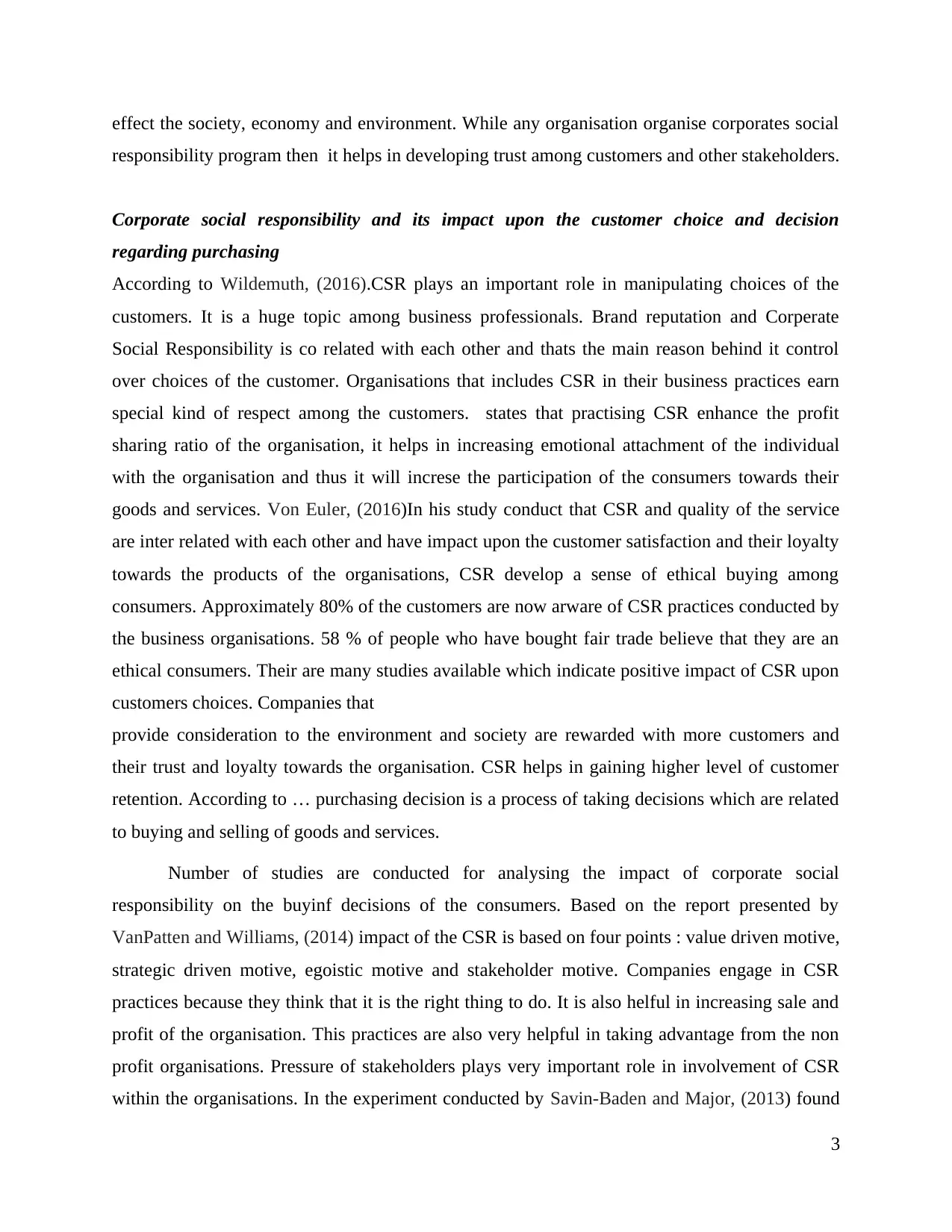
effect the society, economy and environment. While any organisation organise corporates social
responsibility program then it helps in developing trust among customers and other stakeholders.
Corporate social responsibility and its impact upon the customer choice and decision
regarding purchasing
According to Wildemuth, (2016).CSR plays an important role in manipulating choices of the
customers. It is a huge topic among business professionals. Brand reputation and Corperate
Social Responsibility is co related with each other and thats the main reason behind it control
over choices of the customer. Organisations that includes CSR in their business practices earn
special kind of respect among the customers. states that practising CSR enhance the profit
sharing ratio of the organisation, it helps in increasing emotional attachment of the individual
with the organisation and thus it will increse the participation of the consumers towards their
goods and services. Von Euler, (2016)In his study conduct that CSR and quality of the service
are inter related with each other and have impact upon the customer satisfaction and their loyalty
towards the products of the organisations, CSR develop a sense of ethical buying among
consumers. Approximately 80% of the customers are now arware of CSR practices conducted by
the business organisations. 58 % of people who have bought fair trade believe that they are an
ethical consumers. Their are many studies available which indicate positive impact of CSR upon
customers choices. Companies that
provide consideration to the environment and society are rewarded with more customers and
their trust and loyalty towards the organisation. CSR helps in gaining higher level of customer
retention. According to … purchasing decision is a process of taking decisions which are related
to buying and selling of goods and services.
Number of studies are conducted for analysing the impact of corporate social
responsibility on the buyinf decisions of the consumers. Based on the report presented by
VanPatten and Williams, (2014) impact of the CSR is based on four points : value driven motive,
strategic driven motive, egoistic motive and stakeholder motive. Companies engage in CSR
practices because they think that it is the right thing to do. It is also helful in increasing sale and
profit of the organisation. This practices are also very helpful in taking advantage from the non
profit organisations. Pressure of stakeholders plays very important role in involvement of CSR
within the organisations. In the experiment conducted by Savin-Baden and Major, (2013) found
3
responsibility program then it helps in developing trust among customers and other stakeholders.
Corporate social responsibility and its impact upon the customer choice and decision
regarding purchasing
According to Wildemuth, (2016).CSR plays an important role in manipulating choices of the
customers. It is a huge topic among business professionals. Brand reputation and Corperate
Social Responsibility is co related with each other and thats the main reason behind it control
over choices of the customer. Organisations that includes CSR in their business practices earn
special kind of respect among the customers. states that practising CSR enhance the profit
sharing ratio of the organisation, it helps in increasing emotional attachment of the individual
with the organisation and thus it will increse the participation of the consumers towards their
goods and services. Von Euler, (2016)In his study conduct that CSR and quality of the service
are inter related with each other and have impact upon the customer satisfaction and their loyalty
towards the products of the organisations, CSR develop a sense of ethical buying among
consumers. Approximately 80% of the customers are now arware of CSR practices conducted by
the business organisations. 58 % of people who have bought fair trade believe that they are an
ethical consumers. Their are many studies available which indicate positive impact of CSR upon
customers choices. Companies that
provide consideration to the environment and society are rewarded with more customers and
their trust and loyalty towards the organisation. CSR helps in gaining higher level of customer
retention. According to … purchasing decision is a process of taking decisions which are related
to buying and selling of goods and services.
Number of studies are conducted for analysing the impact of corporate social
responsibility on the buyinf decisions of the consumers. Based on the report presented by
VanPatten and Williams, (2014) impact of the CSR is based on four points : value driven motive,
strategic driven motive, egoistic motive and stakeholder motive. Companies engage in CSR
practices because they think that it is the right thing to do. It is also helful in increasing sale and
profit of the organisation. This practices are also very helpful in taking advantage from the non
profit organisations. Pressure of stakeholders plays very important role in involvement of CSR
within the organisations. In the experiment conducted by Savin-Baden and Major, (2013) found
3
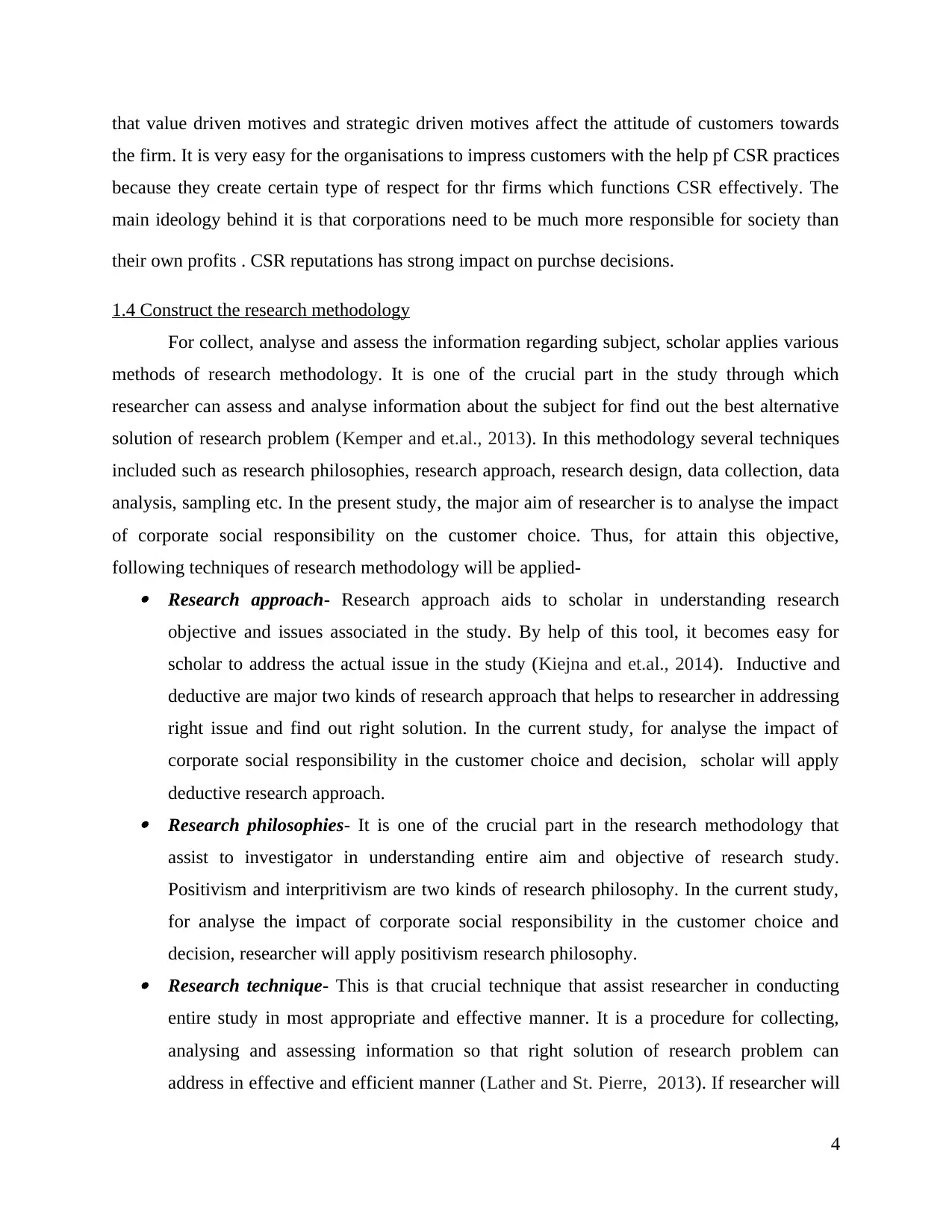
that value driven motives and strategic driven motives affect the attitude of customers towards
the firm. It is very easy for the organisations to impress customers with the help pf CSR practices
because they create certain type of respect for thr firms which functions CSR effectively. The
main ideology behind it is that corporations need to be much more responsible for society than
their own profits . CSR reputations has strong impact on purchse decisions.
1.4 Construct the research methodology
For collect, analyse and assess the information regarding subject, scholar applies various
methods of research methodology. It is one of the crucial part in the study through which
researcher can assess and analyse information about the subject for find out the best alternative
solution of research problem (Kemper and et.al., 2013). In this methodology several techniques
included such as research philosophies, research approach, research design, data collection, data
analysis, sampling etc. In the present study, the major aim of researcher is to analyse the impact
of corporate social responsibility on the customer choice. Thus, for attain this objective,
following techniques of research methodology will be applied- Research approach- Research approach aids to scholar in understanding research
objective and issues associated in the study. By help of this tool, it becomes easy for
scholar to address the actual issue in the study (Kiejna and et.al., 2014). Inductive and
deductive are major two kinds of research approach that helps to researcher in addressing
right issue and find out right solution. In the current study, for analyse the impact of
corporate social responsibility in the customer choice and decision, scholar will apply
deductive research approach. Research philosophies- It is one of the crucial part in the research methodology that
assist to investigator in understanding entire aim and objective of research study.
Positivism and interpritivism are two kinds of research philosophy. In the current study,
for analyse the impact of corporate social responsibility in the customer choice and
decision, researcher will apply positivism research philosophy. Research technique- This is that crucial technique that assist researcher in conducting
entire study in most appropriate and effective manner. It is a procedure for collecting,
analysing and assessing information so that right solution of research problem can
address in effective and efficient manner (Lather and St. Pierre, 2013). If researcher will
4
the firm. It is very easy for the organisations to impress customers with the help pf CSR practices
because they create certain type of respect for thr firms which functions CSR effectively. The
main ideology behind it is that corporations need to be much more responsible for society than
their own profits . CSR reputations has strong impact on purchse decisions.
1.4 Construct the research methodology
For collect, analyse and assess the information regarding subject, scholar applies various
methods of research methodology. It is one of the crucial part in the study through which
researcher can assess and analyse information about the subject for find out the best alternative
solution of research problem (Kemper and et.al., 2013). In this methodology several techniques
included such as research philosophies, research approach, research design, data collection, data
analysis, sampling etc. In the present study, the major aim of researcher is to analyse the impact
of corporate social responsibility on the customer choice. Thus, for attain this objective,
following techniques of research methodology will be applied- Research approach- Research approach aids to scholar in understanding research
objective and issues associated in the study. By help of this tool, it becomes easy for
scholar to address the actual issue in the study (Kiejna and et.al., 2014). Inductive and
deductive are major two kinds of research approach that helps to researcher in addressing
right issue and find out right solution. In the current study, for analyse the impact of
corporate social responsibility in the customer choice and decision, scholar will apply
deductive research approach. Research philosophies- It is one of the crucial part in the research methodology that
assist to investigator in understanding entire aim and objective of research study.
Positivism and interpritivism are two kinds of research philosophy. In the current study,
for analyse the impact of corporate social responsibility in the customer choice and
decision, researcher will apply positivism research philosophy. Research technique- This is that crucial technique that assist researcher in conducting
entire study in most appropriate and effective manner. It is a procedure for collecting,
analysing and assessing information so that right solution of research problem can
address in effective and efficient manner (Lather and St. Pierre, 2013). If researcher will
4
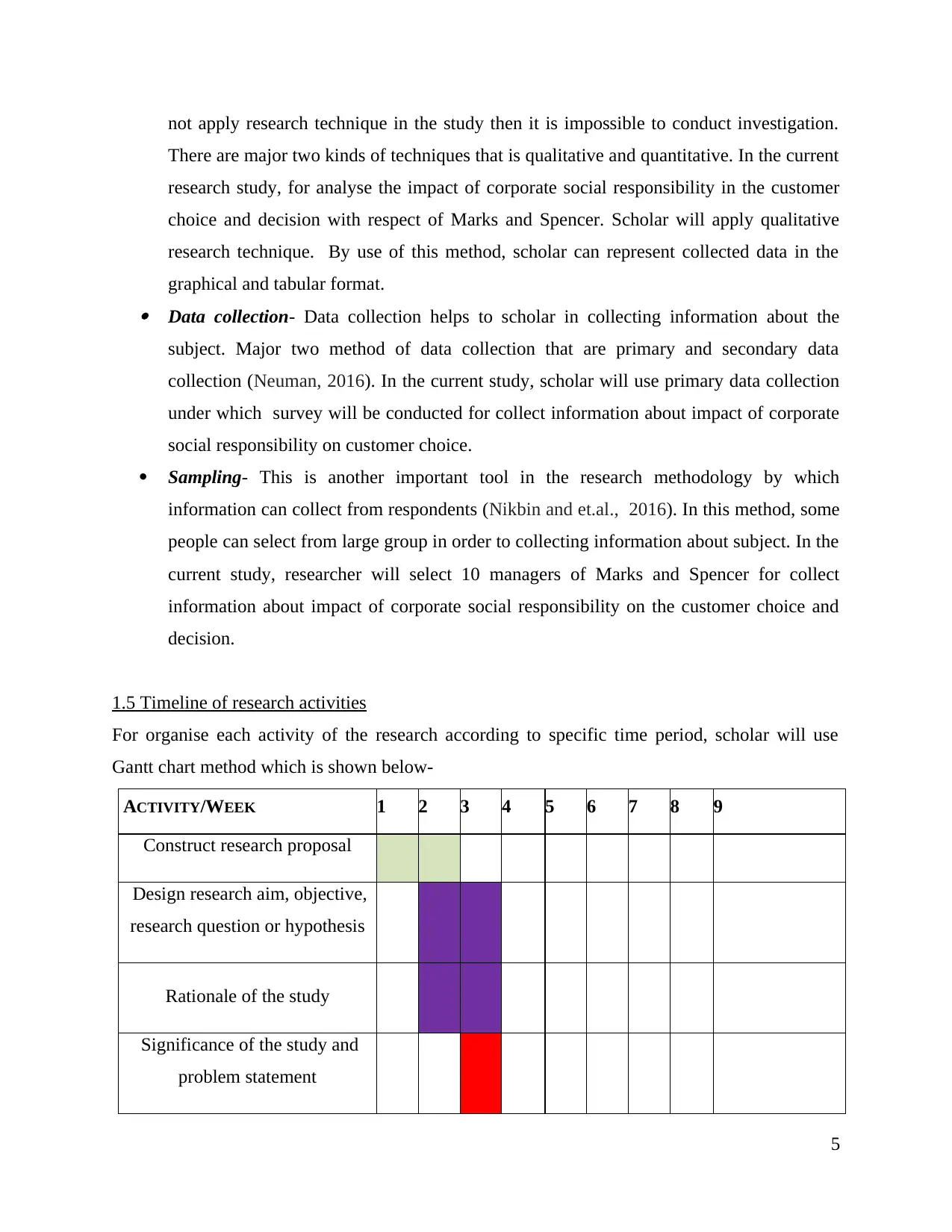
not apply research technique in the study then it is impossible to conduct investigation.
There are major two kinds of techniques that is qualitative and quantitative. In the current
research study, for analyse the impact of corporate social responsibility in the customer
choice and decision with respect of Marks and Spencer. Scholar will apply qualitative
research technique. By use of this method, scholar can represent collected data in the
graphical and tabular format. Data collection- Data collection helps to scholar in collecting information about the
subject. Major two method of data collection that are primary and secondary data
collection (Neuman, 2016). In the current study, scholar will use primary data collection
under which survey will be conducted for collect information about impact of corporate
social responsibility on customer choice.
Sampling- This is another important tool in the research methodology by which
information can collect from respondents (Nikbin and et.al., 2016). In this method, some
people can select from large group in order to collecting information about subject. In the
current study, researcher will select 10 managers of Marks and Spencer for collect
information about impact of corporate social responsibility on the customer choice and
decision.
1.5 Timeline of research activities
For organise each activity of the research according to specific time period, scholar will use
Gantt chart method which is shown below-
ACTIVITY/WEEK 1 2 3 4 5 6 7 8 9
Construct research proposal
Design research aim, objective,
research question or hypothesis
Rationale of the study
Significance of the study and
problem statement
5
There are major two kinds of techniques that is qualitative and quantitative. In the current
research study, for analyse the impact of corporate social responsibility in the customer
choice and decision with respect of Marks and Spencer. Scholar will apply qualitative
research technique. By use of this method, scholar can represent collected data in the
graphical and tabular format. Data collection- Data collection helps to scholar in collecting information about the
subject. Major two method of data collection that are primary and secondary data
collection (Neuman, 2016). In the current study, scholar will use primary data collection
under which survey will be conducted for collect information about impact of corporate
social responsibility on customer choice.
Sampling- This is another important tool in the research methodology by which
information can collect from respondents (Nikbin and et.al., 2016). In this method, some
people can select from large group in order to collecting information about subject. In the
current study, researcher will select 10 managers of Marks and Spencer for collect
information about impact of corporate social responsibility on the customer choice and
decision.
1.5 Timeline of research activities
For organise each activity of the research according to specific time period, scholar will use
Gantt chart method which is shown below-
ACTIVITY/WEEK 1 2 3 4 5 6 7 8 9
Construct research proposal
Design research aim, objective,
research question or hypothesis
Rationale of the study
Significance of the study and
problem statement
5
Paraphrase This Document
Need a fresh take? Get an instant paraphrase of this document with our AI Paraphraser
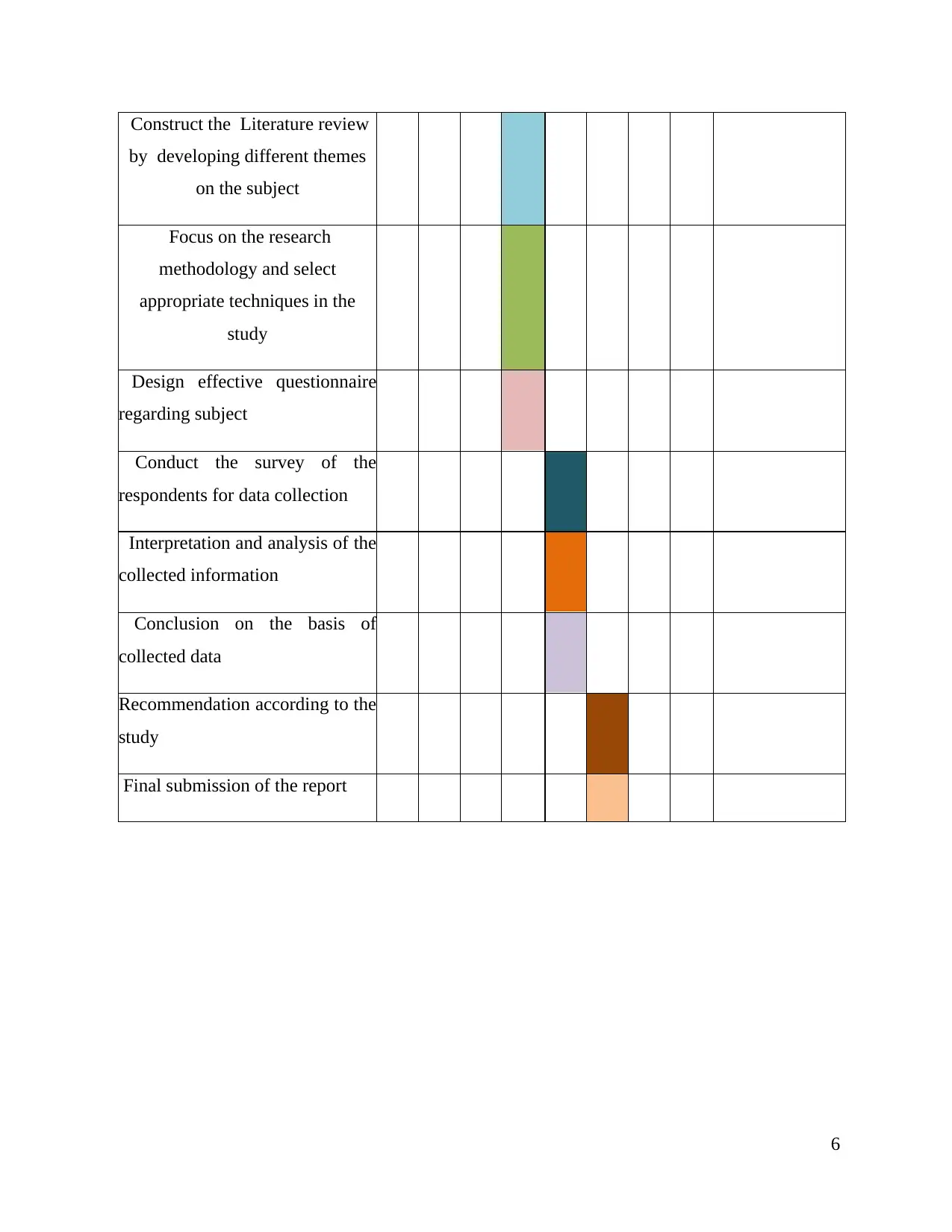
Construct the Literature review
by developing different themes
on the subject
Focus on the research
methodology and select
appropriate techniques in the
study
Design effective questionnaire
regarding subject
Conduct the survey of the
respondents for data collection
Interpretation and analysis of the
collected information
Conclusion on the basis of
collected data
Recommendation according to the
study
Final submission of the report
6
by developing different themes
on the subject
Focus on the research
methodology and select
appropriate techniques in the
study
Design effective questionnaire
regarding subject
Conduct the survey of the
respondents for data collection
Interpretation and analysis of the
collected information
Conclusion on the basis of
collected data
Recommendation according to the
study
Final submission of the report
6
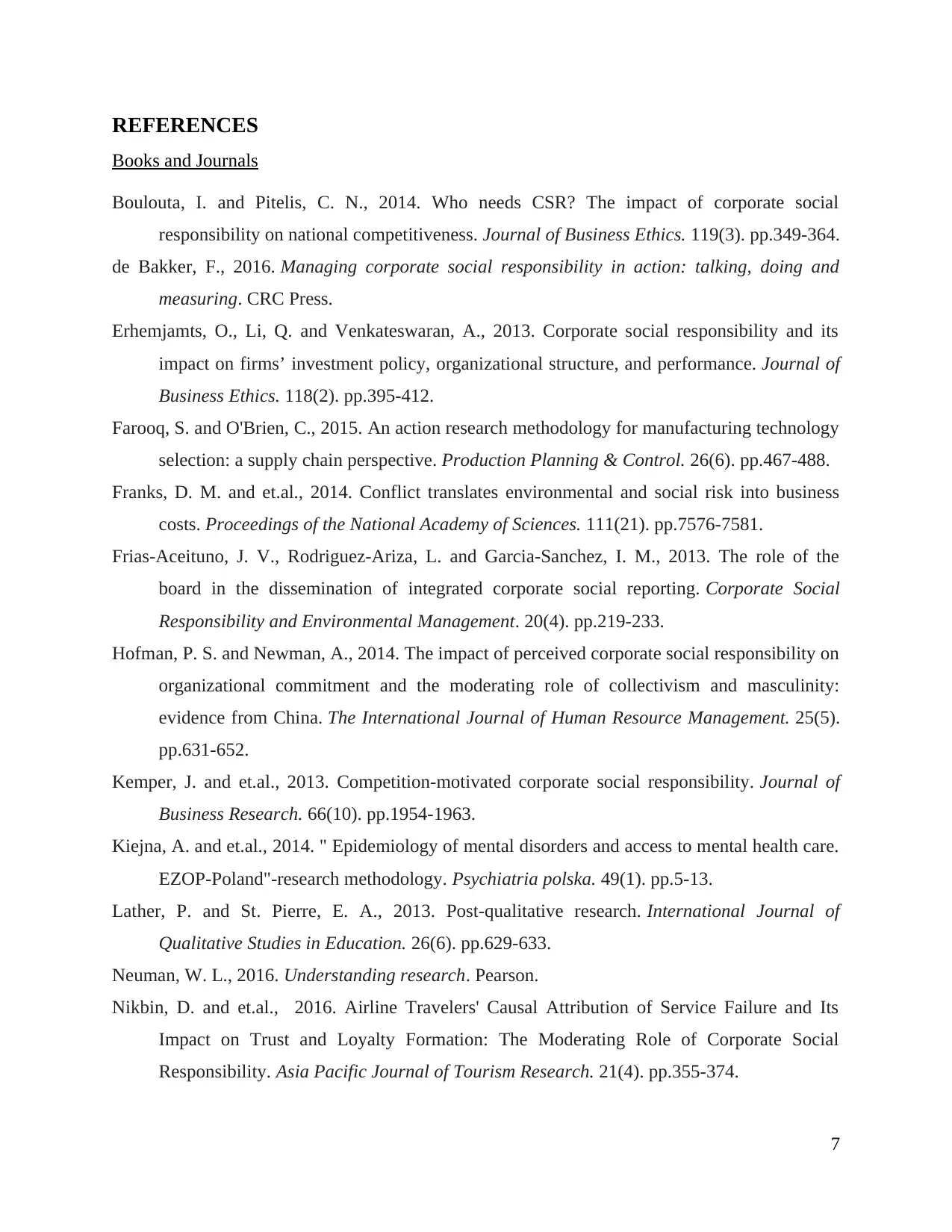
REFERENCES
Books and Journals
Boulouta, I. and Pitelis, C. N., 2014. Who needs CSR? The impact of corporate social
responsibility on national competitiveness. Journal of Business Ethics. 119(3). pp.349-364.
de Bakker, F., 2016. Managing corporate social responsibility in action: talking, doing and
measuring. CRC Press.
Erhemjamts, O., Li, Q. and Venkateswaran, A., 2013. Corporate social responsibility and its
impact on firms’ investment policy, organizational structure, and performance. Journal of
Business Ethics. 118(2). pp.395-412.
Farooq, S. and O'Brien, C., 2015. An action research methodology for manufacturing technology
selection: a supply chain perspective. Production Planning & Control. 26(6). pp.467-488.
Franks, D. M. and et.al., 2014. Conflict translates environmental and social risk into business
costs. Proceedings of the National Academy of Sciences. 111(21). pp.7576-7581.
Frias‐Aceituno, J. V., Rodriguez‐Ariza, L. and Garcia‐Sanchez, I. M., 2013. The role of the
board in the dissemination of integrated corporate social reporting. Corporate Social
Responsibility and Environmental Management. 20(4). pp.219-233.
Hofman, P. S. and Newman, A., 2014. The impact of perceived corporate social responsibility on
organizational commitment and the moderating role of collectivism and masculinity:
evidence from China. The International Journal of Human Resource Management. 25(5).
pp.631-652.
Kemper, J. and et.al., 2013. Competition-motivated corporate social responsibility. Journal of
Business Research. 66(10). pp.1954-1963.
Kiejna, A. and et.al., 2014. " Epidemiology of mental disorders and access to mental health care.
EZOP-Poland"-research methodology. Psychiatria polska. 49(1). pp.5-13.
Lather, P. and St. Pierre, E. A., 2013. Post-qualitative research. International Journal of
Qualitative Studies in Education. 26(6). pp.629-633.
Neuman, W. L., 2016. Understanding research. Pearson.
Nikbin, D. and et.al., 2016. Airline Travelers' Causal Attribution of Service Failure and Its
Impact on Trust and Loyalty Formation: The Moderating Role of Corporate Social
Responsibility. Asia Pacific Journal of Tourism Research. 21(4). pp.355-374.
7
Books and Journals
Boulouta, I. and Pitelis, C. N., 2014. Who needs CSR? The impact of corporate social
responsibility on national competitiveness. Journal of Business Ethics. 119(3). pp.349-364.
de Bakker, F., 2016. Managing corporate social responsibility in action: talking, doing and
measuring. CRC Press.
Erhemjamts, O., Li, Q. and Venkateswaran, A., 2013. Corporate social responsibility and its
impact on firms’ investment policy, organizational structure, and performance. Journal of
Business Ethics. 118(2). pp.395-412.
Farooq, S. and O'Brien, C., 2015. An action research methodology for manufacturing technology
selection: a supply chain perspective. Production Planning & Control. 26(6). pp.467-488.
Franks, D. M. and et.al., 2014. Conflict translates environmental and social risk into business
costs. Proceedings of the National Academy of Sciences. 111(21). pp.7576-7581.
Frias‐Aceituno, J. V., Rodriguez‐Ariza, L. and Garcia‐Sanchez, I. M., 2013. The role of the
board in the dissemination of integrated corporate social reporting. Corporate Social
Responsibility and Environmental Management. 20(4). pp.219-233.
Hofman, P. S. and Newman, A., 2014. The impact of perceived corporate social responsibility on
organizational commitment and the moderating role of collectivism and masculinity:
evidence from China. The International Journal of Human Resource Management. 25(5).
pp.631-652.
Kemper, J. and et.al., 2013. Competition-motivated corporate social responsibility. Journal of
Business Research. 66(10). pp.1954-1963.
Kiejna, A. and et.al., 2014. " Epidemiology of mental disorders and access to mental health care.
EZOP-Poland"-research methodology. Psychiatria polska. 49(1). pp.5-13.
Lather, P. and St. Pierre, E. A., 2013. Post-qualitative research. International Journal of
Qualitative Studies in Education. 26(6). pp.629-633.
Neuman, W. L., 2016. Understanding research. Pearson.
Nikbin, D. and et.al., 2016. Airline Travelers' Causal Attribution of Service Failure and Its
Impact on Trust and Loyalty Formation: The Moderating Role of Corporate Social
Responsibility. Asia Pacific Journal of Tourism Research. 21(4). pp.355-374.
7
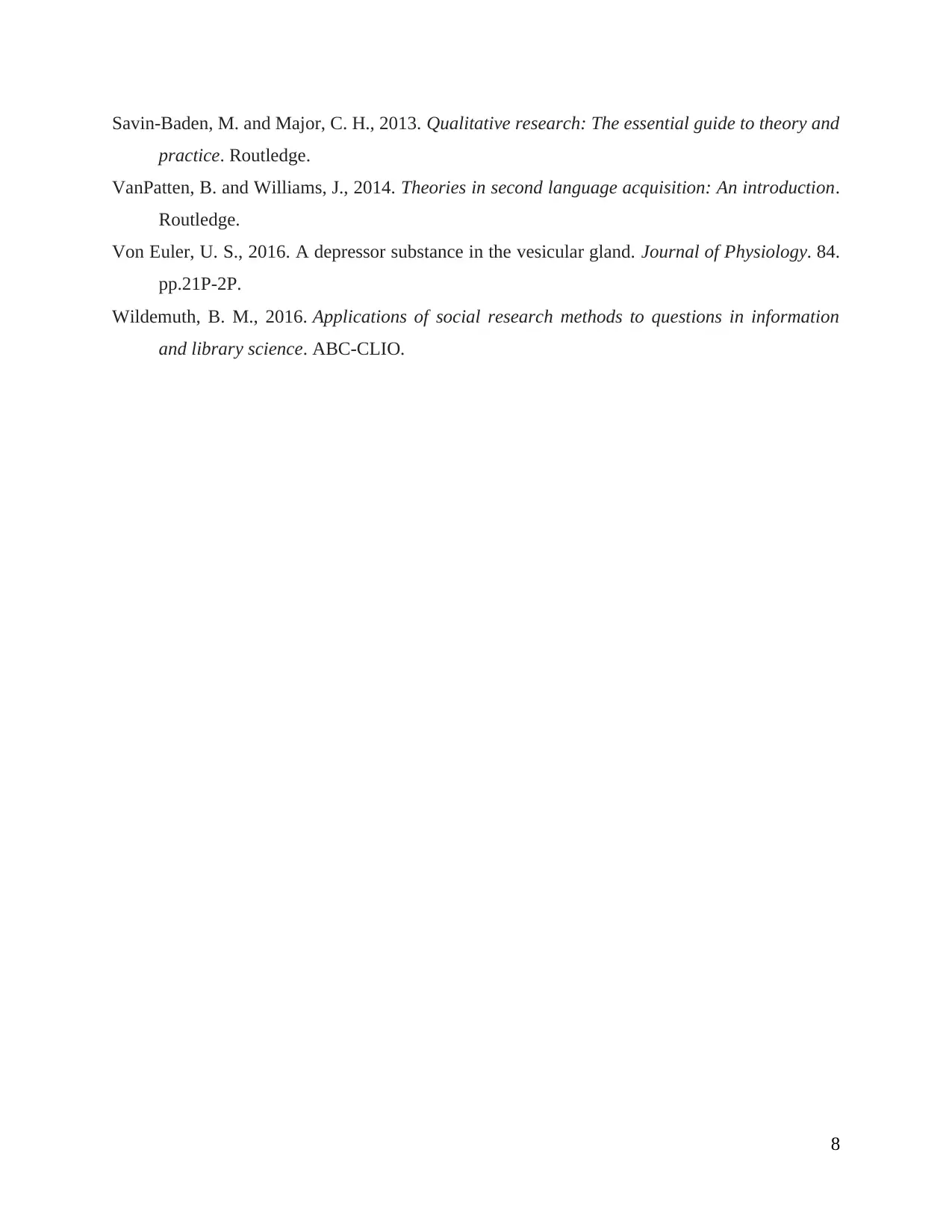
Savin-Baden, M. and Major, C. H., 2013. Qualitative research: The essential guide to theory and
practice. Routledge.
VanPatten, B. and Williams, J., 2014. Theories in second language acquisition: An introduction.
Routledge.
Von Euler, U. S., 2016. A depressor substance in the vesicular gland. Journal of Physiology. 84.
pp.21P-2P.
Wildemuth, B. M., 2016. Applications of social research methods to questions in information
and library science. ABC-CLIO.
8
practice. Routledge.
VanPatten, B. and Williams, J., 2014. Theories in second language acquisition: An introduction.
Routledge.
Von Euler, U. S., 2016. A depressor substance in the vesicular gland. Journal of Physiology. 84.
pp.21P-2P.
Wildemuth, B. M., 2016. Applications of social research methods to questions in information
and library science. ABC-CLIO.
8
1 out of 10
Related Documents
Your All-in-One AI-Powered Toolkit for Academic Success.
+13062052269
info@desklib.com
Available 24*7 on WhatsApp / Email
![[object Object]](/_next/static/media/star-bottom.7253800d.svg)
Unlock your academic potential
© 2024 | Zucol Services PVT LTD | All rights reserved.





